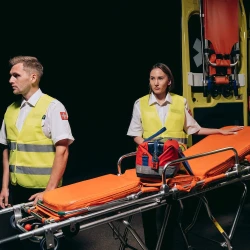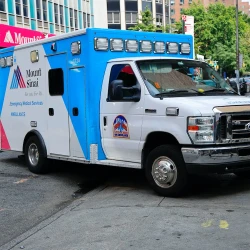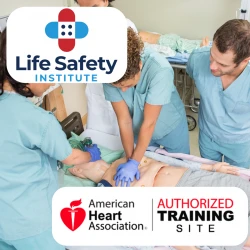If you ever dreamed of becoming a superhero when you were a kid, we’ve got good news. While there might not be a cape involved, we can teach you Basic Life Support because, at the Life Safety Institute, we know that everyone can save a life.
As the saying goes, “Not all heroes wear capes,” and it’s possible to be a hero -- a true lifesaver -- to someone in need. All it takes is a little education and the confidence to make the call in a life-threatening emergency.
Unfortunately, there is plenty of opportunity to make a positive impact in the event of a life-threatening emergency.
Did you know that an average 475,000 Americans die from cardiac arrest or heart attack, annually? Worldwide, cardiac arrest proves more fatal than the total number of deaths resulting from: automobile accidents, breast cancer, colorectal cancer, firearms, HIV, house fires, influenza, pneumonia, and prostate cancer.
In other words, there is more than enough need for Basic Life Support than will probably ever be met. So, if you’re inspired to do your part, we encourage you to read on!
The following will give you an overview of what you can expect to learn from Life Safety’s Basic Life Support course, along with a profile of ideal course participants and why anyone might need or want to pursue a course in Basic Life Support.
As with all Life Safety Institute courses, we believe that education surrounding safety and life support should be available to everyone, which is why we offer financing via affirm. You have the option of paying the $85 course fee in full, or splitting the cost into four interest-free payments of $22.
Whatever works for your budget, we are happy to accommodate in order to save you a seat in class!
Ready to get started?
Not so fast!
Before you enroll, let’s cover the basics of Basic Life Support…
What is Basic Life Support?
Before you consider enrolling in a Basic Life Support class, you’ll want some details regarding what it’s all about.
Overall, the goal of a Basic Life Support class is to teach you the signs of life-threatening emergencies and empower you to effectively assess them in order to resolve each situation successfully.
What Will I Learn in a Basic Life Support Course?
This is a great question since life support, as a concept, is critical but vague. Among other important details, you will complete your Basic Life Support course confident in the following lifesaving skills:
-
How to Perform Cardiopulmonary Resuscitation -- More commonly referred to as CPR, you will learn how to perform chest compressions on a person whose heart has stopped beating for whatever reason. Our CPR training includes the critical specifics between performing CPR for adults, children, and infants. We will teach you how to complete this lifesaving task, regardless of the environment you’re in; for instance, a medical setting or somewhere more pedestrian like a restaurant, fitness center, movie theater or grocery store. In other words, we will train you in the specifics of CPR, while ensuring that you feel comfortable performing this critical task in just about any setting.
-
How to Operate Automated External Defibrillators -- You’ve likely seen these devices mounted on the walls of public buildings like schools, gyms, or nursing homes. AEDs are portable devices able to detect and analyze electrical cardiac activity. In addition, AEDs provide electrical therapy in order to restore a heart’s normal cardiac rhythm. Knowing how to use an AED, along with CPR is invaluable in the event of an unexpected cardiac event, whether suffered by an adult, child or infant.
-
How to Stop Someone from Choking -- No matter the age -- adult, child, or infant -- a choking episode is scary to experience and frightening to witness. Our Basic Life Support course will show you how to assess an airway obstruction and respond with the right lifesaving strategy to stop a choking event.
You can see that each one of these three skills is useful and important for anyone to know, which begs the question -- who should take a Basic Life Support course?
If you ask us, we would answer, “anyone and everyone!” While that may be true, the following populations tend to seek out our Basic Life Support course, in order to realize some larger personal or professional goals.
Should I Take a Basic Life Support Course?
Yes, everyone should! Basic Life Support strategies and solutions are important for anyone to know.
That said, we find that the majority of our students fall into some specific categories, such as:
- Bystanders -- This group of people has either witnessed or is concerned about encountering a life threatening scenario while going about their day to day business out in the world. In other words, these people want to know what to do if they ever need to act fast. They aren’t taking a Basic Life Support course for professional advancement or some other requirement. No, the Bystanders simply believe in being prepared and armed with lifesaving skills. As actor and singer/songwriter turned EMT, Bobby Sherman, said, “Take some time to learn first aid and CPR. It saves lives, and it works.”
Of course you don’t have to take it from Bobby Sherman. According to the
American Heart Association, bystander CPR is a big deal. Out of Hospital Cardiac Arrests (OHCA) typically happens in homes and residences (70%), with public settings coming in second at !8.8%, and nursing homes 11.2%.
Performed immediately, CPR can increase the chance of survival by double or even triple.
-
Parents: Old, New, and… Revisited -- Although most of us might associate new parents as the anxious types, worried about what to do if their baby chokes or their toddler suffers some sort of respiratory distress, we’ve seen it all. Some “experienced” parents never thought they needed a Basic Life Support course until their kids got really invested in sports or outdoor pursuits that naturally put them at a greater risk of accident or injury. In fact, many of our Basic Life Support courses are well attended by grandparents, determined to empower themselves to help their grandchildren in the case of an emergency, if need be.
-
Caregivers -- This category specifically concerns those who care for the elderly, whether at home or at a facility of some kind. Even if you’re not a part of the medical staff, or simply visit your beloved grandparent on a routine basis, knowing some Basic Life Support skills ahead of an emergency is invaluable.
-
Coaches -- anyone who coaches a sport geared towards any age or ability should absolutely invest in a Basic Life Support course in order to bring your A-game for your players, team fans, and on-field or court colleagues.
-
Healthcare Professionals -- This is perhaps the obvious part of our program; however, it’s important to note that our courses are ideal for any healthcare professionals who need to recertify or refresh their skills set on the latest life saving strategies.
There are some careers, outside of the medical field, that require proof of CPR certification, including first responders, child-care providers, and lifeguards, along with personal trainers or physical therapists.
Show Off Some Street Cred
Successful completion of the Life Safety Institute’s Basic Life Support course means that you’ll receive an American Heart Association Basic Life Support e-card, sent straight to your inbox, which provides proof of your 2-Year Valid AHA Certification.
Spread the Word -- Basic Life Support Class Starts Soon!
With our next Basic Life Support course opportunities kicking off soon, you’ll want to mark these dates and get enrolled ahead of time. All classes are hosted in the evening from 6:00 - 9:00 p.m., with the first class offered on April 1 (No, we’re not kidding!)
Get started today and sign up for Life Safety Institute's Basic Life Support!




